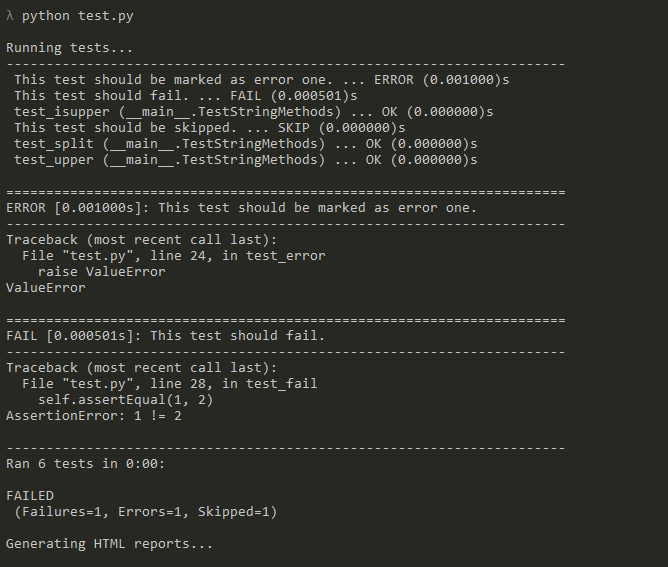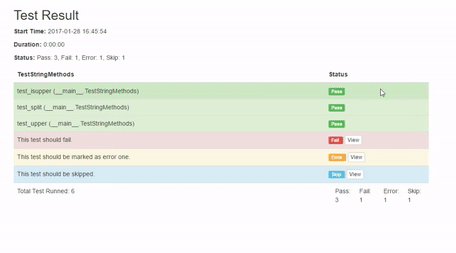HtmlTest runner is a unittest test runner that save test results in Html files, for human readable presentation of results.
This Package was inspired in unittest-xml-reporting and
HtmlTestRunner by tungwaiyip.
This project was created due to needs of getting human readables reports
for test runned, i found one but was lack and with a lot of bad practice,
but i liked how xml-reporting works. So i create this one that
incorporated code from both projects but up to date.
To install HtmlTestRunner, run this command in your terminal:
$ pip install html-testRunnerThis is the preferred method to install HtmlTestRunner, as it will always install the most recent stable release. If you don't have pip installed, this Python installation guide can guide you through the process.
import HtmlTestRunner
import unittest
class TestStringMethods(unittest.TestCase):
""" Example test for HtmlRunner. """
def test_upper(self):
self.assertEqual('foo'.upper(), 'FOO')
def test_isupper(self):
self.assertTrue('FOO'.isupper())
self.assertFalse('Foo'.isupper())
def test_split(self):
s = 'hello world'
self.assertEqual(s.split(), ['hello', 'world'])
# check that s.split fails when the separator is not a string
with self.assertRaises(TypeError):
s.split(2)
def test_error(self):
""" This test should be marked as error one. """
raise ValueError
def test_fail(self):
""" This test should fail. """
self.assertEqual(1, 2)
@unittest.skip("This is a skipped test.")
def test_skip(self):
""" This test should be skipped. """
pass
if __name__ == '__main__':
unittest.main(testRunner=HtmlTestRunner.HTMLTestRunner(output='example_dir'))Just import HtmlTestRunner from package, then pass it to unittest.main with the testRunner keyword. This class have only one required parameter, with is output this is use to place the report of the TestCase, this is saved under a reports directory.
For does who have test suites it works too, just create a runner instance and call the run method with your suite. Here an example:
from unittest import TestLoader, TestSuite
from HtmlTestRunner import HTMLTestRunner
import ExampleTest
import Example2Test
example_tests = TestLoader().loadTestsFromTestCase(ExampleTests)
example2_tests = TestLoader().loadTestsFromTestCase(Example2Test)
suite = TestSuite([example_tests, example2_tests])
runner = HTMLTestRunner(output='example_suite')
runner.run(suite)This is an example of what you got in the console.
This is a sample of the results from the template that came by default with the runner. If you want to use your own template you can pass the abolute path to it when instanciating the HtmlTestRunner class, like HtmlTestRunner(output='example_suite', template='path/to/template', report_title='My Report'.
Your template must use jinja2 syntax, since this is the engine we use.
report_title is the title we want to appear at the top of the report. When using a custom template, these values are pass.
title: This is the report nameheaders: This is a dict with 3 items:start_time: When the test was run.duration: How much it took to runstatus: a string with how much test pass, fail, throw an error or were skip. Note: Remenber on jinja templetes dict can be access throw dot notation, e.g:{{headers.status}}
testcase_name: The name of the Testcase class.tests_results: A list of lists, each inner list contains 4 elements, in the following order:- Test description or test name: If test does not have docs string, test name is used.
- Status: Could be one of ('success', 'danger', 'warning', 'info')
- Error type
- Error message
total_tests: The amount of tests run
You can access these values a vars, for rendering just surround it with {{ var }}, for tests_results you need to iterate it. Click here for a template example, this is the default one shipped with the package.
- Add Test
- Improve documentation
- Add custom templates
- Add xml results
- Add support for Python2.7
- Add support for one report when running test suites.
Contributions are welcome, and they are greatly appreciated! Every little bit helps, and credit will always be given.
For more info please click here
This package was created with Cookiecutter and the audreyr/cookiecutter-pypackage project template.



